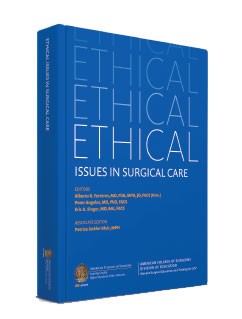Time is the one thing that concerns cancer patients most. Some of the most common questions our patients ask include how quickly they can be treated, how long their treatments will last, and importantly for many, how much time they have left.
In medicine, we often cite studies that say it can take up to 17 years for clinical innovations to reach widespread adoption.1 Unfortunately, the truth is, too many don’t have 17 years to wait for the latest advances to reach them. Patients need our greatest innovations now.
A new program from the American College of Surgeons, called the Cancer Surgery Standards Program (CSSP), aims to give patients more time specifically by improving the quality of their surgical care, and collecting more—and better—data to help surgeons continuously improve.
The program will implement technical standards for cancer operations, beginning with breast, colon, lung and rectal cancers and melanoma. Compliance with these standards will soon be a requirement for hospitals accredited by the ACS Commission on Cancer (CoC), and that’s a good thing. Evidence shows adherence to technical standards for cancer surgery, such as those described in the ACS Operative Standards for Cancer Surgery manuals, improves post-surgical outcomes.2,3 Patients whose breast and gastric cancer operations meet technical standards live longer than patients who don't. Getting standards from the books into daily practice for surgeons is one of the most important things we can do.
These standards won’t be static. We want to learn more, find new ways to improve, and implement innovations as quickly as we can, helping more surgeons achieve continuous quality improvement. We’ll do it by:
- Setting standards: We will work with multiple disease-site experts, including those within the CoC, National Accreditation Program for Breast Centers (NAPBC), and National Accreditation Program for Rectal Centers (NAPRC), to create and implement standards. We’ll also work closely with the cancer registry community to ensure we create standards that are most clinically relevant and easy to implement.
- Documenting results: We will develop synoptic operative report templates to make documentation easier and monitor adherence to the new standards. These reports will allow us to capture up to twice as much detail as is typically collected in a surgeon’s narrative report.4 They have several advantages, including the ability (soon) for data to be automatically entered into the National Cancer Database (NCDB) where it can be used for ongoing research. The reports will be easy to implement and should not require significant additional work for surgeons and surgical teams.
- Conducting research and identifying new ways to improve: Using data delivered to the NCDB from synoptic operative reports, the ACS Cancer Research Program will conduct new studies. We’ll determine what’s working well and ensure all surgeons are aware. We can also identify concerns and take steps to fix them. The new research will help us update standards or implement new ones when we know they will impact patient care.
- Disseminating improvements to save and extend lives: It won’t take 17 years for results to reach patients. The CSSP includes digital education tools that make it easy for surgeons, trainees, registrars and others to implement the standards and keep updated on changes as they occur. Tools and resources also will be accessible at the point-of-care.
We know the most important thing we can give our patients with cancer is time. By bringing more research discoveries to the frontlines of care, then identifying ways to continuously improve, we hope to do that.
Please take a moment to learn more about the program by visiting the Cancer Surgery Standards Program website.
References
- Slote Morris Z, Wooding S and Grant J. The answer is 17 years, what is the question: understanding time lags in translational research. J R Soc Med. 2011 Dec;104(12):510-20. DOI:10.1258/jrsm.2011.110180.
- Zhao B, Tsai C, Hunt KK, et al. Adherence to surgical and oncologic standards improves survival in breast cancer patients. J Surg Oncol. 2019 Aug;120(2):148-159. DOI: 10.1002/jso.25506
- Zhao B, Blair SL, Katz MHG, et al. Adherence with operative standards in the treatment of gastric cancer in the United States. Gastric Cancer. 2020 May;23(3):550-560. DOI:10.1007/s10120-019-01028-5.
- Bidwell SS, Merrell SB, Poles G, Morris AM. Implementation of a synoptic operative report for rectal cancer: a mixed-methods study. Dis Colon Rectum. 2020 Feb;63(2): 190-199. DOI: 10.1097/DCR.0000000000001518.
About the Author
Matthew H.G. Katz, MD, FACS, is chair of the Cancer Surgery Standards Program. He also is Chief of Pancreatic Surgery Service at MD Anderson Cancer Center at the University of Texas in Houston.





